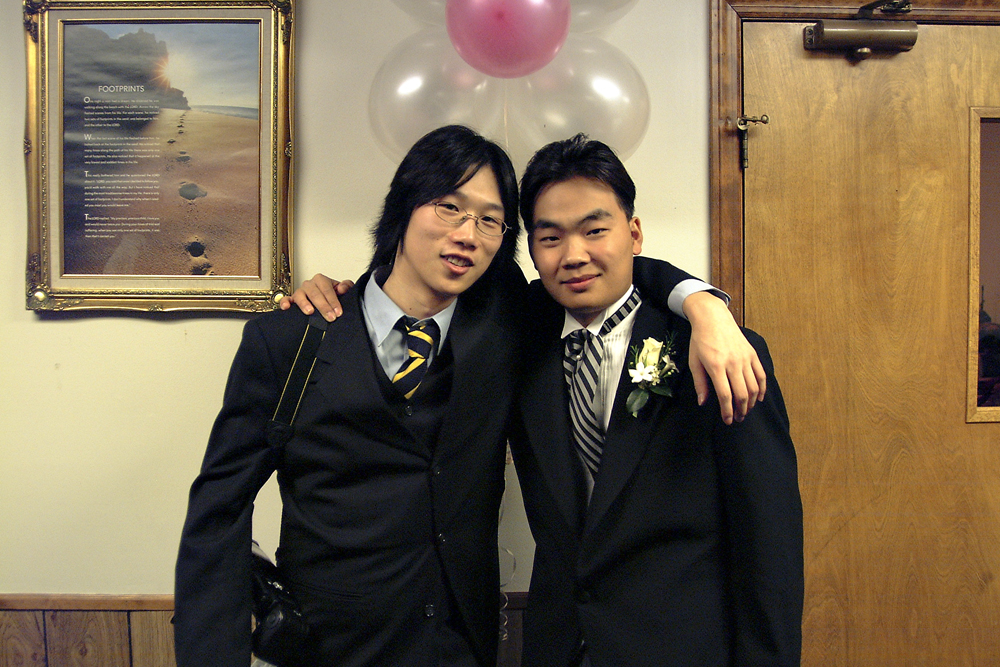I.
Historical Context of Chinua Achebe
The
novel “Things Fall Apart”, published in 1958, is Chinua Achebe’s
(1930- ) the first work.1
Chinua Achebe was born in Nigeria in 1930.2 When Achebe was
five years old, he landed in the town of Ogidi. He was raised by his
father who was a fervent Christian. His father had been spreading the
Gospel around Nigeria for thirty years.3 Mission-work in
Nigeria related with colonialism of England. At that time, the missionaries
missed the important cultural richness in Nigeria.4
Therefore, the strategy of Churches for mission-work did not focus on
cultural setting of Nigeria. Therefore, Achebe’s father, as a native
missionary of Nigeria, was colonized. So, Achebe states that his family
looked down on adherents of traditional Igbo religion, calling them
“heathen” or “the people of nothing.”5
Although
Chinua Achebe had some difficulties adjusting Christian tradition into
Nigeria (Igbo6) tradition, Achebe had a strong curiosity
on beliefs and study. Through Achebe’s diligent work, he got an admission
to a British-run boarding school with an excellent library.7
Achebe loved not only English literature, but also Igbo tales. So, he
studied English, history and religion at the University of Ibadban.
In 1953, he graduated and taught school for a while, then he worked
as radio producer at the Nigerian Broadcasting Corp. At that time, he
abandoned his European first name (Albert), and begun writing a novel
about the collision of Europe and Africa.8 In 1956, when
Achebe traveled to England, he showed his handwritten manuscript of
his novel to a novelist and the man offered to publish it. In 1958,
the novel, Things Fall Apart, was published.9
Nigeria
was colonized before the 20th century by England. Things Fall Apart
was set at a time of the clash between Nigeria’s white colonial government
and the Nigerian indigenous tradition in the 1890s, which was a struggle
to re-illuminate colonialism. When Achebe wrote Things Fall Apart,
other intellectual groups also contemplated the conflict between British
colonialism and indigenous tradition.
On
the other hand, Christianity faced new theological requests from Asia,
Africa, and Latin America. Churches from Asia, Africa, and Latin America
tried to re-illuminate western theology in terms of their own cultural
settings.10 Chinua Achebe also contemplated reconstructing
Christianity in terms of Nigerian’s cultural setting.
II.
Summary of the Things Fall Apart
Chinua
Achebe quotes Things Fall Apart from Yeasts’ Poem, “The Second
Coming.” I think that Achebe wants to analyze the effects of British
colonialism from a Nigerian perspective. Throughout Things Fall Apart,
Chinua Achebe portrays the conflict between the white colonial government
and the indigenous Igbo people. Achebe opens his story with a portrayal
of Okonkwo, his family, and his clan, the Umuofia. The Umuofia clan
is a part of a consortium of nine villages. Okonkwo’s village is Iguedo,
and he is well known warrior. Okonkwo is wealthy and respected11,
whereas his father, Unoka, who fails to provide for his family and opposes
violence.12 One day, Okonkwo takes charge of the boy, Ikemefua,
whose an necessary to avoid ribal war.13 Ikemefua is a perfect
boy as Okonkwo’s son, and Okonkwo likes him because he fears his first
son, Nwoye, is lazy and weak. However, he did not show his affection
to Ikemefuna.14
Ikemefuna
lives with Okonkwo’s family for three years, and Okonkwo’s son,
Nwoye, respects him as an older brother. Okonkwo liked that because
Nwoye learned a manly attitude.15 One clan member, Ogbuefi
Ezeudu, who is a village elder, tells Okonkwo about an oracle that Ikemefuna
must be killed. Alseo, he says that Okonkwo should not take part in
Ikemefuna’s death because Ikemefuna calls Okonkwo “father.” Okonkwo
lies that it is time to go back Ikemefuna’s home.16 On
the way to Ikemefuna’s village, Ikemefuna is killed by Okonkwo’s
machete. When he dies, he runs to Okonkwo for help. However, Okonkwo
cuts him down because he does not want to show weakness to the men of
Umuofia. When Okonkwo came back to home, his son, Nwoye guesses the
death of Ikemefuna.17 Okonkwo falls into depression, and
he visits his friend, Obierika, to get some comfort from him.18
However,
Okonkwo’s tragedy is not ended. When his friend, Ogbuefi Ezeudu, dies.
Unfortunately, Okonkwo’s gun kills Ogbuefi Ezeude’s son. Since killing
a clan’s man is a serious sin against the earth goddess, Okonkwo has
to leave his village.19 He is exiled to his mother’s village,
Mbanta, with his family and property. As Okonkwo is leaving, Ogbuefi
Ezeudu’s men burn Okonkwo’s house and kill his livestock in order
to cleanse the village of Okonkwo’s sin.20
When
Okonkwo arrives at his mother’s village, his relatives accept him
warmly.21 They help him to rise again. When Okonkwo restarts
life in his mother’s village, he reconciles himself to life.22
Achebe
portrays Okonkwo’s community as having their own laws and customs
to keep harmony and peace. Also, there is strong kinship to maintain
a harmonious and peaceful community. Okonkwo has pride as the man of
the clan. All those elements are a part of the indigenous culture of
the Igbo people. However, the collision between change and tradition
arises, when those elements meet the British Colonialism.
When
Okonkwo lives in exile for two years, Obierika brings money from selling
Okonkwo’s yams.23 Also, he brings the bad news that white
men destroyed a village called Abame.24
After
three years of Okonkwo’s exile, Okonkwo learn of more bad news from
Obierika.25 Six missionaries visited Mbanta. The missionaries’
leader, Mr. Brown, started to say that villagers’ gods are wrong and
that they have to worship only one God. Also, it is an odd concept for
villagers to accept the Holy Trinity as one God.26 Okonkwo
thinks the missionaries are insane, but his son, Nwoye, is fascinated.
Another odd thing is that even though the missionaries try to convert
all the people of Umuofia to Christianity, Mr. Brown does not allow
them to being hostile to the clan.27
Continuously,
the things unexpectedly happened in between missionaries and villagers.
The elder of a villager offered missionaries to build a church in the
forest called the Evil Forest.28 The elder suggested that
some bad things would happen to the missionaries and they will leave
the village. However, nothing happens to the church. Moreover, the church
wins more converts. Okonkwo’s son, Nwoye, also converts to Christianity.29
And, he leaves his father, Okonkwo.30 The church gets more
converts. Also, their faith let them to abandon their traditional faith.
Okonkwo thinks that Mbanta is a womanly clan because they did not agree
with violence, in order to cast forth missionaries.31 At
the close of Okonkwo’s exile, Okonkwo provides a big feast for his
mother’s relative,32 but inwardly, he looks down on him
for being part of such a womanly clan.33
When
Okonkwo returns from exile to Umuofia, everything is changed. The church
has grown in his village.34 Moreover church plays governmental
power.35 Although Okonkwo and his fellows worried about the
white men’s influence, some villagers liked their influence. The white
men set up a hospital and a school. The people of the village can use
the facilities. Finally, Okonkwo threatens Mr. Brown with violence.
Mr. Brown’s health fails health and he leaves the flocks.36
It was not the end.
A
replacement comes to the Igbo people, Reverend James Smith. He is strict
and an intolerant man. The conflict between the missionaries and village
people is getting serious.37 Eventually, the people of the
village burn the church in order to cleanse their village.38
That event brings them into a catastrophic situation. The white men
imprison the leaders of Umuofia and put them in jail, where they suffer
insults and physical abuse.39
When
the prisoners come back from jail, the villagers are astonished at their
appearance.40 The leaders hold a meeting to deal with the
issue about the white men. During a meeting, five court messengers come
and tell the clansmen to stop. Okonkwo kills one of them, but the others
are let go. Okonkwo realizes that his clan will not fight.41
When
the District Commissioner arrives at Okonkwo’s village, he knows that
Okonkwo committed suicide.42 The District Commissioner thinks
that the story of Okonkwo’s death can be an interesting for reader.
He had already chosen the tile of the book, after much thought: The
Pacification of the Primitive Tribes of the Lower Niger.43
Achebe
describes the process of the breaking down of Igbo people’s harmony,
peace, and customs without private emotion. Ironically, He observes
the process without any judgment. However, Chinua Achebe suggests that
Okonkwo’s story is merely an interesting anecdote for Europeans, but
for him and Nigerians, Okonkwo’s story has deeper meaning than one
book.
Actually,
Chinua Achebe does not deal with theological and religious matters.
However, Chinua Achebe’s context is not systemizing theological issues
in the Church. Chinua Achebe tries to set up the Nigerian perspective
to see their world and Christianity. He keeps his position in between
indigenous religion and Christianity. Also, we need to focus on the
fact that Things Fall Apart was written in the English, colonized
language. It implies that Chinua Achebe informs us to see colonial Nigeria
from their perspective. Also, it argues that Nigerians are not people
of nothing.44
III.
Meaning of Text within Historical Context
First
of all, Chinua Achebe illustrates the colonial period from an African
perspective, not the westernized and colonized perspective. If we see
mission-work in Africa from the Western Perspective, we just think about
the white missionaries who died in the forest of Africa. However, if
we see mission-work in Africa from the African perspective, we would
see what we missed by the shadow of colonialism. Also, Africans lost
their own narrative by European hands. Achebe tried to take back that
narrative.45
Also,
Chinua Achebe’s work is the answering the calling for the independence
of Nigeria. After World War II, many countries got independence from
their colonizers. British Colonialism and other countries’ colonialism
invaded not only politics and economics, but also culture and spirit.
Things Fall Apart describes the processing of the invasion of British
Colonialism. Although Things Fall Apart is not a theological
book, it implies that the African Church struggled with indigenous theology.46
Finally,
Nigeria obtained independence from England in 1960. I think that Chinua
Achebe’s work took part in it. The influence of Things Fall Apart
is not limited in the history of Nigeria. Since 1958, it has sold 11
million copies in about 45 languages.47 Also, Things Fall
Apart takes an important place in not only African literature, but
also in world literature. As copies of Things Fall Apart spread,
it keeps illuminating us to know that there is no such thing as “the
People of Nothing.





